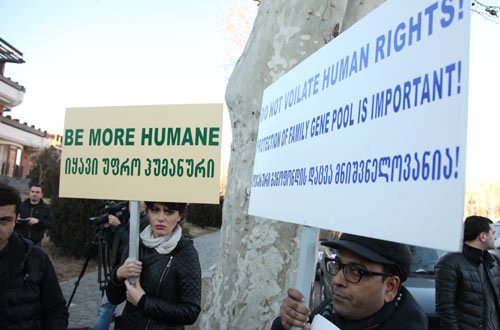
Georgian Orthodox Church Responds to Surrogacy Statement Controversy

Activists protesting against statements on surrogacy and artificial insemination in Patriarch’s Christmas address hold banners outside the Patriarchate on January 8. Photo: Guram Muradov/Civil.ge
After the Georgian Orthodox Church stirred controversy by saying that children born through artificial insemination and surrogacy are “problematic”, the Patriarchate released a statement on January 8 saying that it was “utterly absurd” to think that the Church is “opposing” children born through these methods.
In a written statement read out by Metropolitan Theodore of Akhaltsikhe, the Patriarchate said that although the Church deems such methods “unacceptable”, children born through artificial insemination and surrogacy “require more warmth, love and blessing from the Church.”
“The Patriarch’s Christmas epistle caused a huge and positive feedback from the society, while one part of the society got irritated by the portion of [the Christmas address] which spoke about surrogacy and artificial insemination,” reads the statement by the Patriarchate.
“Some even supposed that the Church is opposing the children born through these methods – that is utterly absurd. On the contrary, these children need more warmth, love and blessing from the Church. Therefore, such children are among those christened by the Patriarch and there is nothing surprising in that,” the statement reads.
“It, however, does not mean that these methods are acceptable. Let us note that almost all the traditional religions oppose it and consider [these methods] to be a sin. The Georgian Patriarch and the clergy are obligated to warn the parish and generally the society about it. The Church respects free choice of any person, but it also points at what it deems to be wrong. This is the duty of the Church,” the statement says.
Meanwhile outside the Patriarchate in Tbilisi a group of activists were gathered on January 8 to protest against surrogacy remarks made in the Patriarch’s Christmas address. Counter-demonstrators also rallied at the same venue, leading to a minor scuffle after counter-demonstrators verbally and physically insulted several activists; four men were detained by the police, which were lined up in between the two groups of demonstrators. The Patriarchate released a separate statement on the same day, distancing itself from violence and calling for calm.
In his written Christmas address the head of the Georgian Orthodox Church, Patriarch Ilia II, laid out Church’s strong opposition to surrogacy, artificial insemination and in vitro fertilization, suggesting that families having children born by surrogate mothers will not be happy. The address also reads: "Those children born through artificial insemination will be problematic too.”
UNM lawmaker, Zurab Japaridze, who was the first among the politicians to react on the Patriarch’s epistle, said in a written statement on January 7: “Most of the women, who become mothers as a result of artificial insemination or through surrogate mother, consider this to be God’s mercy. So in my opinion the Church should be paying to attention to such mothers and their children, instead of rejecting them.”
“As one common citizen of this country, I would like to ask you to return the belief to the families, where the children born through artificial insemination or by surrogate mothers are being raised, that these children are gifts from the God and not the wreath,” MP Japaridze wrote in his address to the Patriarch.
Public Defender, Ucha Nanuashvili, said in a written statement on January 8 that the Church should be “more cautious” when discussing “sensitive issues” related to surrogacy and artificial insemination in order not to cause pain to those who already have or are planning to have a child through these methods.
Healthcare Minister Davit Sergeenko said on January 8: “Those experts, who have provided this recommendation, this analysis to the Patriarch, perhaps should have taken a more thorough look at the matter and should have made comprehensive and delicate analysis of such a sensitive issue.”
This post is also available in: ქართული Русский